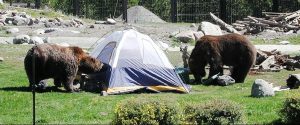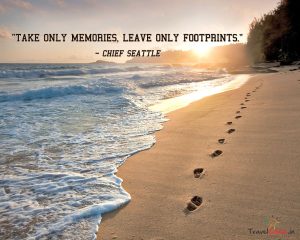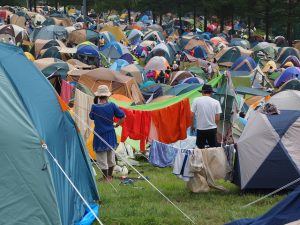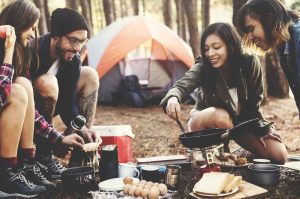Written by Guest Contributor on The Prepper Journal.
Editors Note: A guest contribution from Michael Everett at RainyCamping.com to The Prepper Journal. The best way to learn to be prepared is to learn when life is still normal. As always, if you have information for Preppers that you would like to share and possibly receive a $25 cash award as well as be entered into the Prepper Writing Contest with a chance to win one of three Amazon Gift Cards with the top prize being a $300 card to purchase your own prepping supplies, enter today.
Camping is one of the best ways to get away from the stress of daily life. At your campsite, you and your family can sleep and dine outdoors in a natural and refreshing environment. Whether you are planning to go on your first camping trip or you want to return to camping after a long break, the following tips and ideas will help you to have a great time.
1. Plan Your Activities in Advance
Create a list of camping activities for you and your children. This will help you avoid boredom and prevent the children from getting involved in dangerous stunts. A little brainstorming will help you to generate enough ideas to last for 1 to 3 days. Take a football, kite, board games, fishing gear, a compass and maps for learning and paint and craft items. Incorporate the “location” into the activities. Finds and paint pine cones if available to be a part of an upcoming holiday, bring a book on plants and have a scavenger hunt for the “safe” ones. Be creative in your teaching.
As such you can convert each camping trip to an educational excursion and adventure for your children. Take nature books along and allow the children to have a firsthand experience with the wonders of nature. Schedule photo sessions for both sunrise and sunset and take advantage of these times to capture unique photographs. Add more physical activities like hiking or kayaking if your campsite is near a river or lake.
2. Choose Your Camping Site With Care
The campsite you pick will determine how well you’ll enjoy your trip. Carefully plan how far you want to travel, the type of location (whether you want a coastal area or countryside forest). Decide whether you want to stay in a camp with a lot of facilities or a place in the wild.

Note that camps with plenty of amenities attract a lot of people and are very noisy while areas that are laid back and pristine usually lack basic facilities. Make sure you choose a campsite that is relatively safe so you don’t have to worry about fending off wild bears when you are meant to be sleeping.
3. Create a Camp Box
Creating a camp box can reduce the time you spend packing for your camping trip by half. Start by making a checklist of items you should take for a typical weekend camping trip. Your checklist should include the following:
* Campsite Gear: sleeping bag and pad for each camper, pillows and blankets, heavy duty steel tent stakes and poles, ground cover, extra canopy or tarp, repair kit, chairs, headlamps and lanterns.
* Kitchen Utensils: stove and fuel, lighter, firewood, pot and frying pan, portable coffee maker, trash bags, cooler, ice, water bottles, paper towel, bowls,plates, forks, spoons, and knives.
* Personal Items: toothbrush, toothpaste, toiletries, soap, sunscreen, first aid kit, insect repellent, and any prescription medication.
Update your “Camp Box” as a family exercise after the trip. Have everyone offer suggestions/improvements and most important, what could have been left out.
4. Get Your Camping Gear Off-season
After you have written out the items for your typical camping trip, you need to go shopping to pick up those you don’t have at home. If you are planning for your first camping trip, you should avoid buying so many items during the peak season for hot weather tent camping.
Although June may seem like a nice time to go shopping for camp gear because of the variety of camping gear that will be on display, don’t do it. At this time, tents and other camping gear will be sold at peak prices. Instead, you should buy camping gear in early spring or winter. Many retailers also try to sell off their camp gear at the end of the summer, so you could get very good bargains at that time.
5. Prepare for Night Lighting
A campsite will feel lonely when walk around with light that is coming from your LED headlamp alone. You should have at least one or two extra lighting sources. These will make your campsite and tent look and feel safer and more exciting.

6. Go Unplugged and Leave Some Gadgets at Home

7. Be Creative With Meals
Plan your meals in advance. Make a list of your meals for each day (breakfast, lunch, dinner and two snacks between meals). Then choose simple recipes that you can easily use to cook at your campsite while focusing on meals that you can cook well over an open flame. You can even practice cooking breakfast meals like cinnamon roll-ups in your yard at home.
Before you set out, prepare some of the food at home. It will be easier to cut vegetables, marinate the meat and wrap potatoes in foil before going to your camp. Pack these into your cooler and set out the food meal by meal. Remember to take all the condiments and utensils you will need to serve each meal.
8. Leave No Trace

Conclusion
Apply these simple tips before and during your camping trip. Remember to maintain a positive attitude and make the best of your trip even if you experience unexpected changes in weather at your campsite.
Author’s Bio:

The post 8 Tips for a Great Camping Trip appeared first on The Prepper Journal.
from The Prepper Journal
Don't forget to visit the store and pick up some gear at The COR Outfitters. How prepared are you for emergencies?
#SurvivalFirestarter #SurvivalBugOutBackpack #PrepperSurvivalPack #SHTFGear #SHTFBag





No comments:
Post a Comment